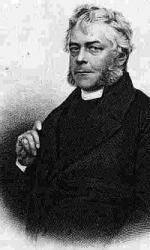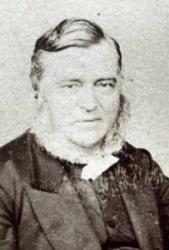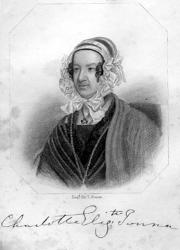Planning worship?
Check out our sister site, ZeteoSearch.org,
for 20+ additional resources related to your search.
- |
User Links
Person Results
‹ Return to hymnal



Export as CSV
David E. Ford

1797 - 1875 Person Name: David Everard Ford Hymnal Number: 621 Author of "How vain is all beneath the skies!" in The Baptist Hymnal Ford, David Everard, son of a Congregational Minister at Long Melford, was born there on Sept. 13, 1797. He became pastor of the Congregational Church at Lymington, in Oct. 1821; Travelling Secretary to the Congregational Union in 1841; and pastor of Greengate Chapel, Salford, Manchester, in 1843. He died at Bedford, Oct. 23, 1875. Mr. Ford published several works including, Hymns chiefly on the Parables of Christ, 1828. From this is taken, (1) "Earthly joys no longer please us" (Heaven Anticipated). (2) "How vain is all beneath the skies" (Heaven Anticipated). These are in American common use. See Hymns of the Church, 1869, and Laudes Domini, 1884. Another of his hymns in common use from the same work, p. 107, is:—"Almighty Father, heavenly Friend" (Old and New Year). This is in Dale's English Hymn Book, 1874.
--John Julian, Dictionary of Hymnology, Appendix, Part II (1907)
David E. Ford
Alaric Alexander Watts
1797 - 1864 Person Name: Alaric A. Watts Hymnal Number: 638 Author (v. 1) of "Never, no never" in The Baptist Hymnal Watts, A. A., p. 1236, i. We find from Alaric Watts: A Narrative of his Life. By his son Alaric Alfred Watts, 2 vols., 1884, that the date of his birth was March 16, 1797, and of his death April 5, 1864.
--John Julian, Dictionary of Hymnology, New Supplement (1907)
Alaric Alexander Watts
William Dickinson
? - 1889 Hymnal Number: 497 Author of "Hallelujah! who shall part" in The Baptist Hymnal Dickinson, William, published in 1846:— Hymns for Passion Week and the Forty Days, Adapted for Churches or for Private Worship, Lond., J. Nisbet & Co., 1846. These hymns deal with such events in the history of Our Lord, as "The Alabaster Box"; "The Barren Fig Tree"; "The Cleansing of the Temple"; "The washing of the Disciples' feet," &c.; and with the Parables of "The Wedding garment"; "The Talents," &c, which are not commonly versified, and are worthy of attention. The following have come into common use:—
1. Calm'd each soul, and clos'd each door. Easterday at Even. This is in the Rugby School Hymn Book, 1876; and as "Calm they sit with closed door," in Kennedy, 1863; and Holy Song, 1869.
2. Ere that solemn hour of doom. The Ten Virgins— Advent. In Kennedy, 1863; and the Rugby School Hymn Book, 1876.
3. Hallelujah, who shall part? Perseverance of the Saints. In several collections, including Spurgeon's Our Own Hymn Book, 1866, &c.
-- John Julian, Dictionary of Hymnology (1907)
=====================
Dickinson, William, p. 293, ii. Another hymn from his Hymns for Passion Week,
William Dickinson
John Eustace Giles

1805 - 1875 Person Name: John E. Giles Hymnal Number: 534 Author of "Thou hast said, exalted Jesus" in The Baptist Hymnal Giles, John Eustace, was born at Dartmouth in 1805, and educated for the ministry at the Baptist College, Bristol. After preaching for a short time at Haverfordwest, he became, in 1830, pastor of the church in Salter's Hall, London. Leaving Baiter's Hall in 1836, he ministered successively at Leeds, Bristol, Sheffield, Bathmines (Dublin), and Clapham Common, London. He died at Clapham Common, June 24, 1875. His prose works include A Funeral Sermon on the Death of Robert Hall; Lectures on Socialism, &c. From childhood he composed hymns and poetical pieces. In 1834, at the request of the Baptist Missionary Committee, he composed a hymn in celebration of Negro emancipation,
and Nos. 9,16, & 24 in their Jubilee Collection, 1842.
The hymn by which he is best known is:—
Hast Thou said, exalted Jesus? Holy Baptism (Adult). It is a composition of special merit, and in English Baptist congregations is probably oftener sung on Baptismal occasions than any other hymn. It was written "during a serious illness, in 1830, and in anticipation of having to baptize several persons at Salter's Hall, London, on his recovery." (Singers and Songs, 1869, p. 482.) It was printed in 1830 in 6 stanzas of 6 lines. In 1858 it was given in the Baptist Psalms & Hymns, No. 705, with the omission of st. ii. The full original text is in the Baptist Hymnal, 1879, No. 639. It is also in several other collections. [Rev. W. R. Stevenson, M.A.]
-- John Julian, Dictionary of Hymnology (1907)
John Eustace Giles
Lucy Sarah Atkins Wilson
1802 - 1863 Person Name: Mrs. Daniel Wilson Hymnal Number: 444 Translator of "O Lord, thy heavenly grace impart" in The Baptist Hymnal Wilson, Lucy, p. 1537, ii., née Atkins, was b. Dec. 28, 1802, and d. Jan. 25, 1863.
--John Julian, Dictionary of Hymnology, Appendix, Part II (1907)
Lucy Sarah Atkins Wilson
Charlotte Elizabeth

1790 - 1846 Person Name: Charlotte Elizabeth Tonna Hymnal Number: 270 Author of "Sinner, what hast thou to show" in The Baptist Hymnal Charlotte Elizabeth was born at Norwich in 1790. Her father, the Rev. Michael Browne, was Rector of S. Giles' parish in that city. She married Captain George Phelan, of the army, but the union proved an unhappy one. Thrown upon her own resources, she contributed to the Dublin Tract Society, and in 1834, became editor of "The Christian Ladies' Magazine." Her husband died in 1837. In 1840, she married Mr. L.H. Tonna, but continued to retain her two Christian names as her literary designation. She died in 1846. Her works are very numerous.
--Annotations of the Hymnal, Charles Hutchins, M.A. 1872.
===========================
Other names: Charlotte Elzabeth Browne Tonna, Mrs. Tonna, Author of Zadoo, Charlotte Elizabeth Phelan
===========================
Tonna, Charlotte Elizabeth, née Browne, commonly known as "Charlotte Elizabeth," was the only daughter of Michael Browne, Rector of St. Giles, Norwich, and was born in Norwich, Oct. 1, 1790. She was first married to Captain George Phelan, of the 60th Rifles (who died in 1837), and secondly to the Rev. Lewis H. Tonna. Her death took place at Ramsgate, July 12, 1846. Under the name of "Charlotte Elizabeth" she published several works, including Chapters on Flowers, Derry, a Tale of the Revolution, Personal Recollections, &c. Her hymns in common use include:—
1. Holy Father, heavenly King (1832). God Man's only Refuge.
2. O God of Israel, deign to smile. For Resignation.
3. O Thou Who didst prepare. For Use at Sea.
4. Sinner, what hast thou to show? Christians' Joy.
5. Soldier go, but not to claim. The Good Fight of Faith.
Of these hymns Nos. 3, 4 appeared in W. Urwick's Dublin Collection of Hymns, 1829.
-- John Julian, Dictionary of Hymnology (1907)
Charlotte Elizabeth
Benjamin Cleveland
1733 - 1811 Person Name: Benjamin Cleaveland Hymnal Number: 376 Author of "O could I find from day to day" in The Baptist Hymnal Cleveland, Benjamin. Probably a Baptist, but known only by his Hymns on Different Spiritual Subjects, in Two Parts, whereof the 4th ed. appeared in Norwich, Connecticut, 1792. He is the author of:—
0 could I find from day to day. [Longing for Christ.] This was preserved from oblivion by the Hartford Selection 1799, and is now in general use as altered and abridged to 4 stanzas by Nettleton, in his Village Hymns, 1824, No. 145. What is supposed to be the original text of the first four stanzas is found in Dr. Hatfield's Church Hymn Book, 1872, No. 876. [Rev. F. M. Bird, M.A.]
--John Julian, Dictionary of Hymnology (1907)
============================
Cleveland, Benjamin. (Windham, Connecticut, August 30, 1733--March 9, 1811, Horton [now Wolfville], Nova Scotia). Baptist. Son of Benjamin Cleveland. The name is sometimes spelled "Cleavland" or "Cleaveland" in family records. He was a layman and a Baptist deacon; little else is known of his life except that of his twelve children, one, Nathan Cleveland, became a Baptist minister. He published in 1792 his Hymns on Different Subjects. In Two Parts in Norwich, Connecticut. His hymn, "O could I find from day to day," was widely reprinted through most of the nineteenth century. In his 1792 collection, it had six stanzas. Joshua Smith reprinted it in 1797, and it was altered for the Hartford Selection of 1799. Asahel Nettleton abridged it to four stanzas and altered it for his Village Hymns in 1824. It was in this form that it was widely sung; it was reprinted in the same for in Edwin Francis Hatfield's Church Hymn Book, 1872. the original first four stanzas treat the desire to "find from day to day a nearness to my God" throughout the course of life, ending in stanza 4 "Thus, till my last expiring breath, Thy goodness I'll adore . . ."
--Thomas W. Hunt, DNAH Archives
Benjamin Cleveland
H. J. M. Hope
1809 - 1872 Person Name: H. J. M'Cracken Hope Hymnal Number: 355 Author of "Jesus is mine" in The Baptist Hymnal Hope, Henry Joy McCracken, a bookbinder, son of James Hope, was born near Belfast, Ireland, in 1809; was in the employ of Messrs. Chambers, Dublin, for many years, and died at Shanemagowston, Dunadry, County Antrim, Ireland, Jan. 19, 1872. His hymn, "Now I have found a Friend" (Jesus the Friend) was privately printed in 1852. It seems to have been suggested by Mrs. Bonar's "Pass away, earthly joy" (p. 162, i.), stanza iv. of which is sometimes associated with it.
--John Julian, Dictionary of Hymnology, Appendix, Part II (1907)
H. J. M. Hope
Marie Mason
1822 - 1881 Person Name: Miss Mary J. Mason, 1822- Hymnal Number: 458 Author of "Saviour, who died for me" in The Baptist Hymnal Mason, Marie J. Miss Mason, who desires to remain unknown, contributed the popular hymn, "Saviour, who died for me" (Self-Consecration), to the Christian Songs for the Sunday Schools, N. Y., 1872, p. 156, in 4 stanzas of 8 lines. It was written in 1871. Born in 1822.
--John Julian, Dictionary of Hymnology, Appendix, Part II (1907)
See also Mary J. Mason.
Marie Mason
John Wingrove
1720 - 1793 Hymnal Number: 504 Author of "Had I ten thousand gifts beside" in The Baptist Hymnal Wingrove, John. A few hymns by this writer are in J. Middleton's Hymns, 1793. D. Sedgwick dates his pieces 1785. One of these still in common use is, "Hail! my ever blessed Jesus." b. 1720; d. 1793.
--John Julian, Dictionary of Hymnology, Appendix, Part II (1907)
John Wingrove


 My Starred Hymns
My Starred Hymns


